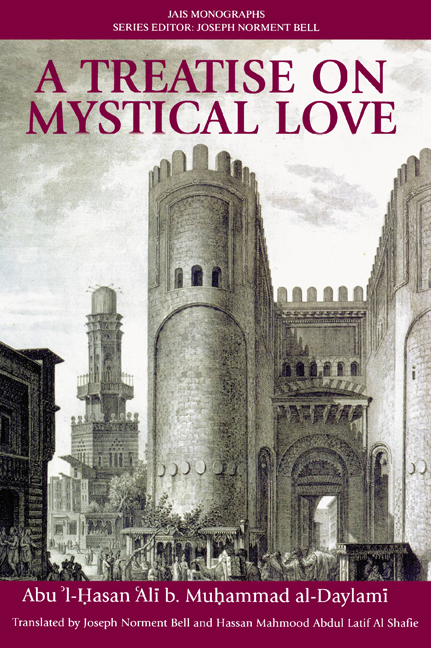Book contents
- Frontmatter
- Contents
- Dedication
- Acknowledgments
- Introduction
- Manuscript title page in English
- Author’s Preface
- I On the Chapters of the Book
- II May the Word cIshq Be Applied to Love for God and from God?
- III Preliminary Considerations
- IV On the Word Love, Its Derivation, and Its Meanings
- V On the Origin and Beginning of Love and Eros
- VI On the Essence and Quiddity of Love
- VII On the Diverse Views People Hold about Love
- VIII On the Description and Character of Eros
- IX On Praiseworthy Love
- X On Those Who Disparaged Love for Some Cause
- XI On the Effects of Love [and Eros] and Their Signs and Symptoms
- XII On the Signs of Love, Including the Sayings of Unimpeachable Spiritual Authorities among the Mystics and the Righteous
- XIII On the Classification of Love according to Our Opinion
- XIV On the Signs of God’s Love for Man
- XV On the Explanation of the Signs of Man’s Love for God
- XVI On the Signs [of the Love] of Those Who Love One Another in God
- XVII On the Love of the Elite among Believers
- XVIII On the Love of the Commonality of Muslims
- XIX On the Love of All Other Animate Beings
- XX On the Meaning of the Word Shahid
- XXL On the Definition of the Perfection of Love
- XXII On Those Who Died of Natural Love
- XXIII On Those Who Killed Themselves for Love
- XXIV On the Death of Divine Lovers
- Bibliography
- Index of Persons, Peoples, and Places
VI - On the Essence and Quiddity of Love
Published online by Cambridge University Press: 01 October 2020
- Frontmatter
- Contents
- Dedication
- Acknowledgments
- Introduction
- Manuscript title page in English
- Author’s Preface
- I On the Chapters of the Book
- II May the Word cIshq Be Applied to Love for God and from God?
- III Preliminary Considerations
- IV On the Word Love, Its Derivation, and Its Meanings
- V On the Origin and Beginning of Love and Eros
- VI On the Essence and Quiddity of Love
- VII On the Diverse Views People Hold about Love
- VIII On the Description and Character of Eros
- IX On Praiseworthy Love
- X On Those Who Disparaged Love for Some Cause
- XI On the Effects of Love [and Eros] and Their Signs and Symptoms
- XII On the Signs of Love, Including the Sayings of Unimpeachable Spiritual Authorities among the Mystics and the Righteous
- XIII On the Classification of Love according to Our Opinion
- XIV On the Signs of God’s Love for Man
- XV On the Explanation of the Signs of Man’s Love for God
- XVI On the Signs [of the Love] of Those Who Love One Another in God
- XVII On the Love of the Elite among Believers
- XVIII On the Love of the Commonality of Muslims
- XIX On the Love of All Other Animate Beings
- XX On the Meaning of the Word Shahid
- XXL On the Definition of the Perfection of Love
- XXII On Those Who Died of Natural Love
- XXIII On Those Who Killed Themselves for Love
- XXIV On the Death of Divine Lovers
- Bibliography
- Index of Persons, Peoples, and Places
Summary
Section One. The Opinions of the Philosophers
Plato said: “God Most High created all spirits together in the shape of a ball. Then he divided them amongst all creatures, placing them in the body of whomever he chose in his creation.”The author of this book, may God be pleased with him, said: According to this view, love must consist only in the mutual attraction [82] of certain souls to others.
Someone said: “God created the spirits of lovers originally as one spirit. He then split this spirit into two halves and placed each half in a different body. So when two persons happen to have the same original spirit, each half yearns for the other. Indeed, longing was given the name shawq because of the yearning of each half (shiqq) for the other.”
Plato also said: “Love is possible in reality to God alone. Moreover, all things celestial and terrestrial move out of longing for their originator and mover, and for the universal love, which is towards God. Indeed, all the movements of the spheres are the result of their longing for their prime mover and first originator.”
Aristotle said: “A given nature is fond of its like.”Here he is referring to gold, for when copperis mixed with it, its quality is improved, and it will not break if you strike it with a hammer. He also said: “A given nature loves its like.” “Love” here [83] is the solidificationof the molten nature of the elementwhen something else that resembles it is mixed with it, as when gold is added to gold itself, or to some other body that is compatible with it in one element and incompatible with it in another. In the latter case composition is not impossible, but you need to make adjustments to compensate for the way you know one substance to be incompatible with the other.
When he says, “A given nature loves its like,” he means that when brassor copper is mixed with silver, they blend together, and the silver can then be worked suitably, without breaking or becoming brittle, and it does not shatter into pieces when struck with a hammer. Rather, the more it is worked, the greater its malleability and the higher its quality.
- Type
- Chapter
- Information
- A Treatise on Mystical Love , pp. 65 - 76Publisher: Edinburgh University PressPrint publication year: 2020



